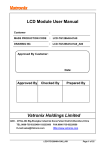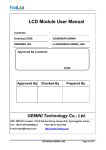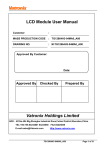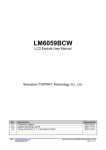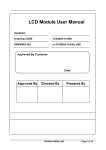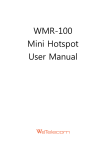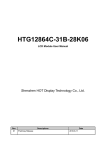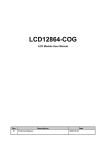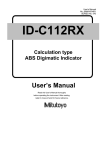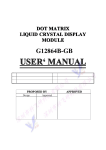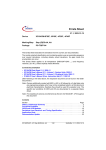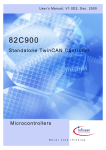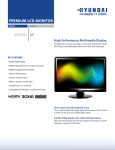Download LCD Module User Manual GEMINI Technology CO., Ltd.
Transcript
LCD Module User Manual Customer : Ordering Part Number : GG12864H-B DRAWING NO. : GG12864J1-02WA0_A00 Approved By Customer: Date: Approved By Checked By Prepared By GEMINI Technology CO., Ltd. ADD: RM1521 Investel, #1123-2 Sanbon-dong, Gunpo-city, Kyeongki-do, 435-040 Korea TEL: +82-31-455-3200 FAX: +82-31-343-2102 E-mail: [email protected] Http://www.findLCD.com GG12864J1-02WA0_A00 Page 1 of 32 Contents 1. Precautions in Use of LCD Module------------------------------------P3 2. General Specification-------------------------------------------------------P3 3. Absolute Maximum Ratings-----------------------------------------------P3 4. Electrical Characteristics--------------------------------------------------P4 5. Backlight Information-------------------------------------------------------P4 6. Optical Characteristics-----------------------------------------------------P5 7. Interface Description--------------------------------------------------------P6 8. Contour Drawing & Block Diagram--------------------------------------P7 9. Application circuit------------------------------------------------------------P8 10. LCD Function Description-----------------------------------------------P8 11. User instruction Definitions--------------------------------------------P16 11.1 Instruction table-----------------------------------------------------P16 11.2 Instruction description --------------------------------------------P17 12. Timing Characteristics -------------------------------------------------P24 13. Initializing flow chart ----------------------------------------------------P27 14. Display Data RAM Map ------------------------------------------------P31 15. Revision records--------------------------------------------------------P32 GG12864J1-02WA0_A00 Page 2 of 32 1. Precautions in Use of LCD Module (1) Avoid applying excessive shocks to the module or making any alterations or modifications to it. (2) Don’ t make extra holes on the printed circuit board, modify its shape or change the components of LCD Module. (3) Don’ t disassemble the LCM. (4) Don’ t operate it above the absolute maximum rating. (5) Don’ t drop, bend or twist LCM. (6) Soldering: only to the I/O terminals. ⑺ Storage: please storage in anti-static electricity container and clean environment. 2. General Specification ITEM STANDARD VALUE UNIT Number of dots 128X64 Dots Dots Outline dimension 93.7(W)X53.0(H)X5.5MAX.(T) mm View Area 70.7(W)X38.8(H) mm Active area 66.52(W)X33.24(H) mm Dot size 0.48(W)X0.48(H) mm Dot pitch 0.52(W)X0.52(H) mm LCD type STN,Blue,Negative ,transmissive View direction 6 o’clock Backlight White LED Controller Sitronix ST7565R Interface Type Parallel interface,8080 series 3. Absolute Maximum Ratings ITEM SYMBOL MIN. Operating Temperature TOP -20 Storage Temperature TST MAX. UNIT - +70 ℃ -30 - +80 ℃ VI 0 - VDD V Supply Voltage For Logic VDD 0 - 3.6 V Supply Voltage For LCD VDD-V EE 0 - 13.0 V Input Voltage GG12864J1-02WA0_A00 TYP. Page 3 of 32 4. Electrical Characteristics ITEM SYMBOL Logic Voltage VDD-VSS Supply Volt.For LCD VDD-VO CONDITION Ta=25℃ MIN. TYP. MAX. UNIT 2.8 3.0 3.3 V --- 9.0 --- V Input High Volt. VIH - 2.0 - VDD V Input Low Volt. VIL - -0.3 - 0.8 V Output High Volt. VOH IoH =-0.2mA 2.4 - VDD V Output Low Volt. VOL IoL=1.6mA 0 - 0.4 V Supply Current IDD --- --- 1.0 mA - 5. Backlight Information Absolute Maximum ratings ( Ta=25℃) Item Symbol Conditions Rating Unit Reverse voltage Vr - 3.5 V Reverse Current Ir - 20 uA Absolute maximum forward Current Ifm --- 100 mA Peak forward current Ifp I msec plus 10% Duty Cycle 30 mA Power dissipation Pd 300 mW Toper -25~+70 ℃ Tst -40~+80 ℃ Operating Temperature Range Storage Temperature Range Electrical/Optical Characteristics (Ta=250C,If=100mA) Color White Wavelength λp(nm) --- Spectral line half widthΔλ(nm) Operating Voltage(v) Forward (±0.15V) Current (mA) --- GG12864J1-02WA0_A00 3.1 100 Page 4 of 32 6. Optical Characteristics ITEM SYMBOL CONDITION MIN TYP MAX UNIT (V)θ CR≧2 10 - 120 deg. (H)φ CR≧2 -45 - 45 deg. Contrast Ratio CR - - 5 - - Response T rise - - 200 300 ms Time T fall - - 150 200 ms View Angle GG12864J1-02WA0_A00 Page 5 of 32 7.Interface Description Parallel interface,8080 series Pin No. Symbol Level Description 1 /CS L Chip select input pins.ActiveLow 2 /RST(/RES) L When /RST is "L", initialization is executed. Register select input pin 3 A0(D/I,RS) H/L A0 = "H": Indicates that "A0" are display data A0 = "L": Indicates that "A0" are control data When connected to an 8080 MPU Write signal. Low active . When connected to a 6800 Series MPU: 4 /WR(R/W) H/L This is the read/write control signal input terminal. When R/W = “H”: Read. When R/W = “L”: Write. When connected to an 8080 MPU, this is Read signal. Low active. 5 /RD(E) H/L When connected to a 6800 Series MPU. This is the 6800 Series MPU enable clock input terminal. 6~13 DB0~DB7 14 15 16 17 18 19 20 21 22 23 24 25 26 VDD VSS VOUT CAP3+ CAP1CAP1+ CAP2+ CAP2V4 V3 V2 V1 V0 27(RED) A 28(Black) K Parallel mode:Data bus DB0~DB7. Serial mode: H/L DB6: Serial input clock SCLK DB7: Serial input data SID 3.3V Power supply for Logic 0V Ground --- DC/DC converter. Connect a capacitor to ground --- DC/DC converter. Connect a capacitor to CAP1--- DC/DC converter. Connect a capacitor to CAP1+ --- DC/DC converter. Connect a capacitor to CAP1--- DC/DC converter. Connect a capacitor to CAP2--- DC/DC converter. Connect a capacitor to CAP2+ --- Voltage levels for LCD. Connect a capacitor to ground --- Voltage levels for LCD. Connect a capacitor to ground --- Voltage levels for LCD. Connect a capacitor to ground --- Voltage levels for LCD. Connect a capacitor to ground --- Voltage levels for LCD. Connect a capacitor to ground +4.2V Anode of LED Backlight 0V Cathode of LED Backlight GG12864J1-02WA0_A00 Page 6 of 32 8. Contour Drawing & Block Diagram GG12864J1-02WA0_A00 Page 7 of 32 9. Application circuit 9.1 Parallel mode,8080 Series MPU interface GG12864J1-02WA0_A00 Page 8 of 32 10. LCD Function Description The LCD built-in Sitronix ST7565R. ST7565R is a single chip driver & controller LSI for graphic dot-matrix liquid crystal display systems. This chip can be connected directly to a microprocessor, accepts serial or 8-bit parallel display data from the microprocessor, stores the display data in an on-chip display data RAM of 65 x 132 bits and generates a liquid crystal display drive signal independent of the microprocessor. It provides a high-flexible display section due to 1-to-1 correspondence between on-chip display data RAM bits and LCD panel pixels. It contains 65 common driver circuits and 132 segment driver circuits, so that a single chip can drive a 65 x 132 dot display. And the capacity of the display can be increased through the use of master/slave multi-chip structures. These chip are able to minimize power consumption because it performs display data RAM read/write operation with no external operation clock. In addition, because it contains power supply circuits necessary to drive liquid crystal,which is a display clock oscillator circuit, high performance voltage converter circuit, high-accuracy voltage regulator circuit, low power consumption voltage divider resistors and OP-Amp for liquid crystal driver power voltage, it is possible to make the lowest power consumption display system with the fewest components for high performance portable systems. On-chip Display Data RAM -Capacity: 65 x 132 = 8,580 bits -RAM bit data “1”: a dot of display is illuminated. -RAM bit data “0”: a dot of display is not illuminated. Various Function Set -Display ON/OFF, set initial display line, set page address, set column address, read status, write/ read display data, select segment driver output, reverse display ON/OFF, entire display ON/OFF, select LCD bias, set/reset modify-read, select common driver output, control display power circuit, select internal regulator resistor ratio for V0 voltage regulation, electronic volume, set static indicator state. -H/W and S/W reset available -Static drive circuit equipped internally for indicators with 4 flashing modes GG12864J1-02WA0_A00 Page 9 of 32 Built-in Analog Circuit -On-chip oscillator circuit for display clock (external clock can also be used) -High performance voltage converter (with booster ratios of x2, x3, x4 and x5, where the step-up reference voltage can be used externally) -High accuracy voltage regulator (temperature coefficient: -0.05%/ºC or external input) -Electronic contrast control function (64 steps) -Vref = 2.1V±3% (V0 voltage adjustment voltage) -High performance voltage follower (V1 to V4 voltage divider resistors and OP-Amp for increasing drive capacity) Operating Voltage Range - Supply voltage (VDD): 2.4 to 3.6 V - LCD driving voltage (VLCD = V0 - VSS): 4.5 to 13.0 V Low Power Consumption -Operating power: 400uA typical. (Condition: VDD = 3V, x 4 boosting(VCI is VDD),V0 = 11V, internal power supply ON, display OFF and normal mode is selected) -Standby power: 30uA maximum. (During power save [standby] mode) Microprocessor interface -High-speed 8-bit parallel interface with 6800-series or 8080-series. -Serial interface (only write operation) available. Chip Select Input There are /CS1 pins for chip selection. The LCM can interface with an MPU only when /CS is "L" . When these pins are set to any other combination, RS, E_RDB, and RW_WRB inputs are disabled and DB0 to DB7 are to be high impedance. And, in case of serial interface, the internal shift register and the counter are reset. Parallel / Serial Interface LCM used ST7565P has three types of interface with an MPU, which are one serial and two parallel interfaces. The interface type is determined by P/S pin as shown in following table. P/S Interface Type CS1B Interface mode 6800-series MPU mode H Parallel /CS 8080-series MPU mode L Serial(Default Status) /CS Serial-mode Parallel interface (P/S = "H") The 8-bit bi-directional data bus is used in parallel interface and the type of MPU is selected by C68 as shown in following table. Microprocessor Selection for Parallel Interface C86 CS1B RS E_RDB RW_WRB DB0 to DB7 Interface mode H /CS RS E RW DB0 to DB7 6800-series L /CS RS /RDB /WR DB0 to DB7 8080-series GG12864J1-02WA0_A00 Page 10 of 32 The type of data transfer is determined by signals at RS, E_RDB and RW_WRB as following Table. Parallel Data Transfer Command 6800-series 8080-series Description A0(RS) E_RDB RW_WRB E_RDB RW_WRB H H H L H Display data read out H H L H L Display data write L H H L H Register status read L H L H L Writes to internal register (instruction) Figure 1. 6800 -Series MPU Interface protocol (P/S=”H”, C86=”H”) Figure 2. 8080 -Series MPU Interface Protocol (P/S=”H”, C86=”L”) GG12864J1-02WA0_A00 Page 11 of 32 Serial Interface (PS = "L", RS=0 Ohms,RP open) When the ST7565P is active, serial data (DB7) and serial clock (DB6) inputs are enabled. And not active, the internal 8-bit shift register and the 3-bit counter are reset. Serial data can be read on the rising edge of serial clock going into DB6 and processed as 8-bit parallel data on the eighth serial clock. Serial data input is display data when A0(RS) is high and control data when A0(RS) is low. Since the clock signal (DB6) is easy to be affected by the external noise caused by the line length, the operation check on the actual machine is recommended. Figure 3. Serial Interface Protocol Busy Flag (For parallel interface only) The Busy Flag indicates whether the LCM is operating or not. When DB7 is "H" in read status operation, this device is in busy status and will accept only read status instruction. If the cycle time is correct, the microprocessor needs not to check this flag before each instruction, which improves the MPU performance. DISPLAY DATA RAM (DDRAM) The Display Data RAM stores pixel data for the LCD. It is 65-row by 132-column addressable array. Each pixel can be selected when the page and column addresses are specified. The 65 rows are divided into 8 pages of 8 lines and the 9th page with a single line (DB0 only). Data is read from or written to the 8 lines of each page directly through DB0 to DB7. The microprocessor can read from and write to RAM through the I/O buffer. Since the LCD controller operates independently, data can be written into RAM at the same time as data is being displayed without causing the LCD flicker. Page Address Circuit The LCM incorporates 4-bit Page A ddress register changed by only the "Set Page" instruction. Page Address 8 (DB3 is "H", but DB2, DB1 and DB0 are "L") is a special RAM area for the icons and display data DB0 is only valid.When Page Address is above 8, it is impossible to access to on-chip RAM. See in “Display Data RAM Map” Line Address Circuit . This circuit assigns DDRAM a Line Address corresponding to the first line (COM0) of the display. Therefore, by setting line address repeatedly, it is possible to realize the screen scrolling and page switching without changing the contents of on-chip RAM as shown in “Display Data RAM Map” It incorporates 6-bit line address register changed by only the initial display line instruction and 6-bit counter circuit. At the beginning of each LCD frame, the contents of register are copied to the line counter which is increased by CL signal and generates the Line Address for transferring the 132-bit RAM data to the display data latch circuit. However, display data of icons are not scrolled because the MPU can not access Line Address of icons. GG12864J1-02WA0_A00 Page 12 of 32 Column Address Circuit Column Address circuit has an 8-bit preset counter that provides column address to the Display Data RAM. When set Column Address MSB / LSB instruction is issued, 8-bit [Y7:Y0] is updated. And, since this address is increased by 1 each a read or write data instruction, microprocessor can access the display data continuously. However, the counter is not increased and locked if a non-existing address above 84H. It is unlocked if a column address is set again by set Column Address MSB / LSB instruction. And the Column Address counter is independent of page address register. ADC select instruction makes it possible to invert the relationship between the Colum n Address and the segment outputs. It is necessary to rewrite the display data on built-in RAM after issuing ADC Select instruction. RESET CIRCUIT Setting /RST to "L" or Reset instruction can initialize internal function. When /RST becomes "L", following procedure is occurred. Display ON / OFF: OFF Entire display ON / OFF: OFF(normal) ADC select: OFF(normal) Reverse display ON / OFF: OFF(normal) Power control register (VC, VR, VF) = (0, 0, 0) Serial interface internal register data clear LCD bias ratio: 1/9 (1/65 duty), 1/8 (1/55 duty), 1/8 (1/49duty),1/6 (1/33 duty) On-chip oscillator OFF Power save release Read-modify-write: OFF SHL select:OFF (normal) Static indicator mode: OFF Static indicator register: (S1, S0) = (0, 0) Display start line: 0 (first) Column address: 0 Page address: 0 Regulator resistor select register: (R2, R1, R0) = (1, 0, 0) Reference voltage set: OFF Reference voltage control register: (SV5, SV4, SV3, SV2, SV1, SV0) = (1, 0, 0, 0, 0, 0) While /RST is "L" or Reset instruction is executed, no instruction except read status could be accepted. Reset status appears at DB4. After DB4 becomes "L", any instruction can be accepted. RESETB must be connected to the reset pin of the MPU, and initialize the MPU and this LSI at the same time. The initialization by RESETB is essential before used. GG12864J1-02WA0_A00 Page 13 of 32 POWER SUPPLY CIRCUITS The Power Supply circuits generate the voltage levels necessary to drive liquid crystal driver circuits with low power consumption and the fewest components. There are voltage converter circuits, voltage regulator circuits, and voltage follower circuits. They are valid only in master operation and controlled by power control instruction. For details, refers to "Instruction Description". Voltage Converter Circuits These circuits boost up the electric potential between VCI and VSS to 2, 3, 4 or 5 times toward positive side and boosted voltage is outputted from VOUT pin. These LCM fixed to 4 times. Voltage Regulator Circuits The function of the internal Voltage Regulator circuits is to determine liquid crystal operating voltage, V0, by adjusting resistors, Ra and Rb, within the range of |V0| < |VOUT|. Because VOUT is the operating voltage of operational-amplifier circuits, it is necessary to be applied internally or externally. For the Eq. 1, we determine V0 by Ra, Rb and VEV. The Ra and Rb are connected internally or externally by INTRS pin. And VEV called the voltage of electronic volume is determined by Eq. 2, where the parameter a is the value selected by instruction, "Set Reference Voltage Register", within the range 0 to 63. VREF voltage at Ta= 25°C is shown in table 1. V0 = ( 1 + Rb / Ra) x VEV [V] ------ (Eq. 1) VEV=(1-(63-a)/162) x VREF [V]-------(Eq. 2) Table 1. VREF Voltage at Ta = 25 °C REF Temp. coefficient VREF [V] H -0.05% / °C 2.1 L External input VEXT Figure 4. Internal Voltage Regulator Circuit GG12864J1-02WA0_A00 Page 14 of 32 In Case of Using Internal Resistors, Ra and Rb. (INTRS = "H") When INTRS pin is "H", resistor Ra is connected internally between VR pin and VSS, and Rb is connected between V0 and VR. We determine V0 by two instructions, "Regulator Resistor Select" and "Set Reference Voltage". The following figure shows V0 voltage measured by adjusting internal regulator resistor ratio (Rb / Ra) and 6-bit electronic volume registers for each temperature coefficient at Ta = 25°C. Figure 5. Electronic Volume Level In Case of Using External Resistors, Ra and Rb. (INTRS = "L") When INTRS pin is "L", it is necessary to connect external regulator resistor Ra between VR and VSS, and Rb between V0 and VR. Example: For the following requirements 1. LCD driver voltage, V0 = 10V 2. 6-bit reference voltage register = (1, 0, 0, 0, 0, 0) 3. Maximum current flowing Ra, Rb = 1uA From Eq. 1 10 = ( 1 + Rb/ Ra) x V EV [V] ------ (Eq. 3) From Eq. 2 VEV=(1-(63-32)/162) x 2.1 =1.698 [V]-------(Eq. 4) From requirement 3. 10 / (Rb + Ra)=1 [uA ] ------ (Eq. 5) From equations Eq.3, 4 and 5 Ra =1.69 [MO] Rb = 8.31 [MO] The following table shows the range of V0 depending on the above requirements. Table 2. V0 Depending on Electronic Volume Level Electronic volume level 0 … 32 … 63 V0 7.57 … 10.00 … 12.43 GG12864J1-02WA0_A00 Page 15 of 32 11. User instruction Definitions 11.1 Instruction table GG12864J1-02WA0_A00 Page 16 of 32 11.2 Instruction Description 1) Display ON / OFF Turns the Display ON or OFF RS RW DB7 DB6 DB5 DB4 DB3 DB2 DB1 DB0 0 0 1 0 1 0 1 1 1 DON DON = 1: display ON DON = 0: display OFF 2) Initial Display Line Sets the line address of display RAM to determine the Initial Display Line. The top row (COM0 when SHL= L, COM63 when SHL = H) of LCD panel. RS RW DB7 DB6 DB5 DB4 DB3 DB2 DB1 DB0 0 0 0 1 ST5 ST4 ST3 ST2 ST1 ST0 ST5 ST4 ST3 ST2 ST1 ST0 Line address 0 0 0 0 0 0 0 0 0 0 0 0 1 1 : : : : : : : 1 1 1 1 1 0 62 1 1 1 1 1 1 63 3) Set Page Address Sets the Page Address of display data RAM from the microprocessor into the Page Address register. Any RAM data bit can be accessed when its Page Address and column address are specified. Along with the column address, the Page Address defines the address of the display RAM to write or read display data. Changing the Page Address doesn't effect to the display status. RS RW DB7 DB6 DB5 DB4 DB3 DB2 DB1 DB0 0 0 1 0 1 1 P3 P2 P1 P0 P3 P2 P1 P0 Page address 0 0 0 0 0 0 0 0 1 1 : : : : : 0 1 1 1 7 1 0 0 0 8 4) Set Column Address Sets the Column Address of display RAM from the microprocessor into the Column Address register. Along with the Column Address, the Column Address defines the address of the display RAM to write or read display data. When the microprocessor reads or writes display data to or from display RAM, Column Addresses are automatically increased. Set Column Address MSB RS RW DB7 DB6 DB5 DB4 DB3 DB2 DB1 DB0 0 0 0 0 0 1 Y7 Y6 Y5 Y4 GG12864J1-02WA0_A00 Page 17 of 32 Set Column Address LSB RS RW DB7 DB6 DB5 0 0 0 0 0 DB4 0 DB3 Y3 DB2 Y2 DB1 Y1 DB0 Y0 Y7 Y6 Y5 Y4 Y3 Y2 Y1 Y0 Column ddress 0 0 0 0 0 0 0 0 0 0 0 0 0 0 0 0 1 1 : : : : : : : : : 1 0 0 0 0 0 1 0 130 1 0 0 0 0 0 1 1 131 5) Read Status (For parallel interface only) Indicates the internal status of the LCM RS RW DB7 DB6 DB5 DB4 DB3 DB2 DB1 DB0 0 1 BUSY ADC ON/OFF /RST 0 0 0 0 Flag BUSY ADC Description The device is busy when internal operation or reset. Any instruction is rejected until BUSY goes Low. 0: chip is active, 1: chip is being busy. Indicates the relationship between RAM column address and segment driver 0: reverse direction (SEG131->SEG0), 1: normal direction (SEG0->SEG131) ON/OFF Indicates display ON/OFF status 0: display ON, 1: display OFF /RST Indicates the initialization is in progress by /RST signal 0: chip is active, 1: chip is being reset 6) Write Display Data 8-bit data of display data from the microprocessor can be written to the RAM location specified by the column address and page address. The column address is increased by 1 automatically so that the microprocessor can continuously write data to the addressed page. RS RW DB7 DB6 DB5 DB4 DB3 DB2 DB1 DB0 1 0 Write data 7) Read Display Data RS RW DB7 DB6 DB5 DB4 DB3 DB2 DB1 DB0 Read data 1 1 GG12864J1-02WA0_A00 Page 18 of 32 Figure 6. Sequence for Writing Display Data Figure7. Sequence for Reading Display Data 8) ADC Select (Segment Driver Direction Select) Changes the relationship between RAM column address and segment driver. The direction of segment driver output pins can be reversed by software. This makes IC layout flexible in LCD module assembly. RS RW DB7 DB6 DB5 DB4 DB3 DB2 DB1 DB0 0 0 1 0 1 0 0 0 0 ADC ADC = 0: normal direction (SEG0->SEG131) ADC = 1: reverse direction (SEG131->SEG0) 9) Reverse Display ON / OFF Reverses the display status on LCD panel without rewriting the contents of the display data RAM. RS RW DB7 DB6 DB5 DB4 DB3 DB2 DB1 DB0 0 0 1 0 1 0 0 1 1 REV REV RAM bit data = "1" RAM bit data = "0" 0(normal) LCD pixel is illuminated LCD pixel is not illuminated 0(reverse) LCD pixel is not illuminated LCD pixel is illuminated 10) Entire Display ON / OFF Forces the whole LCD points to be turned on regardless of the contents of the display data RAM. At this time, the contents of the display data RAM are held. This instruction has priority over the reverse display ON / OFF instruction. RS RW DB7 DB6 DB5 DB4 DB3 DB2 DB1 DB0 EON 0 0 1 0 1 0 0 1 0 EON = 0: normal display EON = 1: entire display ON GG12864J1-02WA0_A00 Page 19 of 32 11) Select LCD Bias Selects LCD bias ratio of the voltage required for driving the LCD. RS RW DB7 DB6 DB5 DB4 DB3 DB2 DB1 DB0 0 0 1 0 1 0 0 0 1 Bias Bias = 0: 1/9 Duty Bias = 1: 1/7 Duty 12) Set Modify-Read This instruction stops the automatic increment of the column address by the read display data instruction, but the column address is still increased by the write display data instruction. And it reduces the load of microprocessor when the data of a specific area is repeatedly changed during cursor blinking or others. This mode is canceled by the reset Modify-read instruction. RS RW DB7 DB6 DB5 DB4 DB3 DB2 DB1 DB0 0 0 1 1 1 0 0 0 0 0 13) Reset Modify-Read This instruction cancels the Modify-read mode, and makes the column address return to its initial value just before the set Modify-read instruction is started. RS RW DB7 DB6 DB5 DB4 DB3 DB2 DB1 DB0 0 0 1 1 1 0 1 1 1 0 Figure 8. Sequence for Cursor Display GG12864J1-02WA0_A00 Page 20 of 32 14) Reset This instruction resets initial display line, column address, page address, and common output status select to their initial status, but dose not affect the contents of display data RAM. This instruction cannot initialize the LCD power supply, which is initialized by the /RST pin. RS RW DB7 DB6 DB5 DB4 DB3 DB2 DB1 DB0 0 0 1 1 1 0 0 0 1 0 15) SHL Select (Common Output Mode Select) COM output scanning direction is selected by this instruction which determines the LCD driver output status. *: Don’t care RS RW DB7 DB6 DB5 DB4 DB3 DB2 DB1 DB0 0 0 1 1 0 0 SHL * * * SHL = 0: normal direction (COM0-> COM63) SHL = 1: reverse direction (COM63->COM0) 16) Power Control Selects one of eight power circuit functions by using 3 -bit register. An external power supply and part of internal power supply functions can be used simultaneously. RS RW DB7 DB6 DB5 DB4 DB3 DB2 DB1 DB0 0 0 0 0 1 0 1 VC VR VF VC 0 1 VR VF Page address Internal voltage converter circuit is OFF Internal voltage converter circuit is ON 0 1 Internal voltage regulator circuit is OFF Internal voltage regulator circuit is ON 0 Internal voltage follower circuit is OFF 1 Internal voltage follower circuit is ON 17) Regulator Resistor Select Selects resistance ratio of the internal resistor used in the internal voltage regulator. See voltage regulator section in power supply circuit. Refer to the following table . RS RW DB7 DB6 DB5 DB4 DB3 DB2 DB1 DB0 0 0 0 0 1 0 0 R2 R1 R0 R2 0 0 0 0 1 1 1 1 R1 0 0 1 1 0 0 1 1 R0 0 1 0 1 0 1 0 1 (1 + Rb / Ra) ratio 3.0 3.5 4.0 4.5 5.0 (default) 5.5 6.0 6.4 GG12864J1-02WA0_A00 Page 21 of 32 18) Reference Voltage Select Consists of 2-byte instruction. The 1st instruction sets reference voltage mode, the 2 one updates the contents of reference voltage register. After second instruction, reference voltage mode is released. st The 1 Instruction: Set Reference Voltage Select Mode RS RW DB7 DB6 DB5 DB4 DB3 DB2 DB1 DB0 0 0 1 0 0 0 0 0 0 1 nd The 2 Instruction: Set Reference Voltage Register RS RW DB7 DB6 DB5 DB4 DB3 DB2 DB1 DB0 0 0 x X SV5 SV4 SV3 SV2 SV1 SV0 SV5 SV4 SV3 SV2 SV1 SV0 Reference voltage parameter (a) V0 Contrast 0 0 0 0 0 0 0 Minimum Low 0 0 0 0 0 1 1 : : : : : : : : : : : : : 1 0 0 0 0 0 32 (default) : : : : : : : : : : : 1 1 1 1 1 0 62 Maximum High 1 1 1 1 1 1 63 19) Set Static Indicator State Consists of two bytes instruction. The first byte instruction (set Static Indicator mode) enables the second byte instruction (set Static Indicator register) to be valid. The first byte sets the Static Indicator ON / OFF. When it is ON, the second byte updates the contents of Static Indicator register without issuing any other instruction and this Static Indicator state is released after setting the data of indicator register. The 1st Instruction: Set Static Indicator Mode (ON / OFF) RS RW DB7 DB6 DB5 DB4 DB3 DB2 DB1 DB0 0 0 1 0 1 0 1 1 0 SM SM = 0: static indicator OFF SM = 1: static indicator ON The 2nd Instruction: Set Static Indicator Register RS RW DB7 DB6 DB5 DB4 DB3 DB2 DB1 DB0 0 0 x x x x x x S1 S0 S1 S0 Status of static indicator output 0 0 OFF 0 1 ON (about 1 second blinking) 1 0 ON (about 0.5 second blinking) 1 1 ON (always ON) 20)NOP No Operation Instruction RS RW DB7 DB6 DB5 DB4 DB3 DB2 DB1 0 0 x x x x x x S1 GG12864J1-02WA0_A00 DB0 S0 Page 22 of 32 21) Power Save (Compound Instruction) If the entire display ON/OFF instruction is issued during the display OFF state, ST7565P enters the Power Save status to reduce the power consumption to the static power consumption value. According to the status of static indicator mode, Power Save is entered to one mode of sleep and standby mode. When Static Indicator mode is ON, standby mode is issued. When OFF, sleep mode is issued. Power Save mode is released by the entire display OFF instruction. Figure 9. Power Save (Compound Instruction) -Sleep Mode This stops all operations in the LCD display system, and as long as there are no access from the MPU, the consumption current is reduced to a value near the static current. The internal modes during sleep mode are as follows: a. The oscillator circuit and the LCD power supply circuit are halted.VSS level. b. All liquid crystal drive circuits are halted, and the segment in common drive outputs output a VSS level. - Standby Mode The duty LCD display system operations are halted and o nly the static drive system for the indicator continues to operate, providing the minimum required consumption current for the static drive. The internal modes are in the following states during standby mode. a. The LCD power supply circuits are halted. The oscillator circuit continues to operate. b. The duty drive system liquid crystal drive circuits are halted and the segment and common driver outputs a VSS level. The static drive system does not operate. When a reset command is performed while in standby mode, the system enters sleep mode. GG12864J1-02WA0_A00 Page 23 of 32 12. Timing Characteristics Read / Write Characteristics (8080-series MPU) (For parallel interface only) Figure 10. Read / Write Characteristics (8080-series MPU) GG12864J1-02WA0_A00 Page 24 of 32 Read / Write Characteristics (6800-series Microprocessor) (For parallel interface only) Figure 11. Read / Write Characteristics (6800-series Microprocessor) GG12864J1-02WA0_A00 Page 25 of 32 Serial Interface Characteristics Figure 12. Serial Interface Characteristics Reset Input Timing Figure 13. Reset Input Timing GG12864J1-02WA0_A00 Page 26 of 32 13.Initializing flow chart Referential Instruction Setup Flow (1) Figure 14. Initializing with the Built-in Power Supply Circuits interface mode GG12864J1-02WA0_A00 Page 27 of 32 Referential Instruction Setup Flow (2) Figure 15. Initializing without the Built-in Power Supply Circuits GG12864J1-02WA0_A00 Page 28 of 32 Referential Instruction Setup Flow (3) Figure 16. Data Displaying GG12864J1-02WA0_A00 Page 29 of 32 Referential Instruction Setup Flow (4) Figure 17. Power OFF GG12864J1-02WA0_A00 Page 30 of 32 14. Display Data RAM Map GG12864J1-02WA0_A00 Page 31 of 32 15. Revision records Version Ref.pages A00 All pages Revision Items New release GG12864J1-02WA0_A00 Date 2011.10.16 Page 32 of 32

































